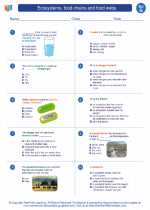Immune Function
The immune system is the body's defense mechanism against pathogens such as bacteria, viruses, and parasites. The immune system is made up of a complex network of cells, tissues, and organs that work together to protect the body from foreign invaders and maintain overall health.
Components of the Immune System
The immune system is comprised of several key components:
- White blood cells (leukocytes): These cells are the primary defenders of the body and include lymphocytes, neutrophils, monocytes, eosinophils, and basophils.
- Antibodies: These are proteins produced by the immune system in response to the presence of specific antigens. They help to neutralize and eliminate pathogens.
- Lymphatic system: This network of tissues and organs, including the thymus, spleen, and lymph nodes, plays a crucial role in the production and transportation of white blood cells and antibodies.
- Bone marrow: This spongy tissue within the bones is responsible for the production of blood cells, including those involved in immune responses.
- Complement system: This group of proteins enhances the ability of antibodies and phagocytic cells to clear microbes and damaged cells from an organism.
Functions of the Immune System
The immune system performs several important functions:
- Identification and elimination of pathogens: The immune system is capable of recognizing and destroying a wide range of harmful microorganisms and foreign substances.
- Memory and recognition: After an initial exposure to a specific pathogen, the immune system can "remember" the invader and mount a faster, more efficient response upon subsequent exposures.
- Protection against cancer: The immune system also plays a role in identifying and eliminating abnormal cells that could develop into cancer.
- Tolerance and self-recognition: The immune system must distinguish between harmful invaders and the body's own healthy cells to prevent autoimmune reactions.
Regulation of the Immune System
The immune system is carefully regulated to prevent overactivity or inappropriate responses. This regulation involves various mechanisms, including:
- Immune checkpoints: These molecules help control the duration and strength of immune responses to prevent excessive damage to healthy tissues.
- Tolerance mechanisms: The immune system has mechanisms in place to ensure that it does not attack the body's own cells and tissues.
- Cytokines: These signaling molecules help coordinate immune responses and maintain balance within the immune system.
Disorders of the Immune System
When the immune system malfunctions, it can lead to various disorders, including:
- Autoimmune diseases: Conditions in which the immune system mistakenly attacks the body's own cells and tissues, such as rheumatoid arthritis, lupus, and type 1 diabetes.
- Immunodeficiencies: These disorders result in a weakened or absent immune response, making individuals more susceptible to infections.
- Allergies: Inappropriate immune responses to harmless substances, leading to allergic reactions.
Study Guide for Immune Function
To study the immune function, it is important to focus on the following key areas:
- Understanding the components of the immune system, including the roles of white blood cells, antibodies, the lymphatic system, bone marrow, and the complement system.
- Exploring the functions of the immune system, such as pathogen recognition and elimination, memory and recognition, cancer protection, and tolerance mechanisms.
- Examining the regulation of the immune system, including the role of immune checkpoints, tolerance mechanisms, and cytokine signaling.
- Identifying and understanding common disorders of the immune system, including autoimmune diseases, immunodeficiencies, and allergies.
It is also helpful to review case studies and real-world examples of immune system function and dysfunction to gain a deeper understanding of the topic.
By mastering these concepts, students can develop a comprehensive understanding of immune function and its significance in maintaining overall health and well-being.
.◂Science Worksheets and Study Guides Seventh Grade. Ecosystems, food chains and food webs

 Activity Lesson
Activity Lesson
 Worksheet/Answer key
Worksheet/Answer key
 Worksheet/Answer key
Worksheet/Answer key
 Worksheet/Answer key
Worksheet/Answer key
 Vocabulary/Answer key
Vocabulary/Answer key
 Vocabulary/Answer key
Vocabulary/Answer key
 Vocabulary/Answer key
Vocabulary/Answer key
 Vocabulary/Answer key
Vocabulary/Answer key
 Vocabulary/Answer key
Vocabulary/Answer key
